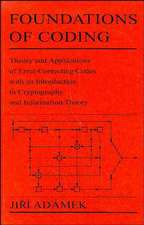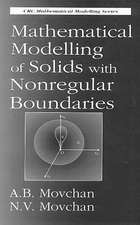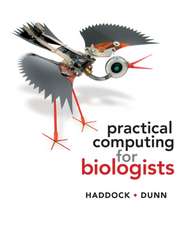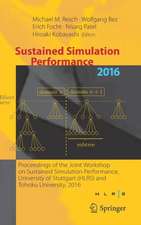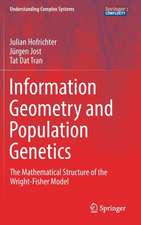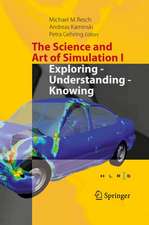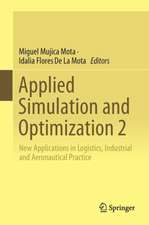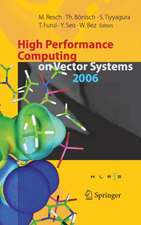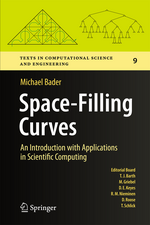A Quest Towards a Mathematical Theory of Living Systems: Modeling and Simulation in Science, Engineering and Technology
Autor Nicola Bellomo, Abdelghani Bellouquid, Livio Gibelli, Nisrine Outadaen Limba Engleză Hardback – 21 iul 2017
This monograph aims to lay the groundwork for the design of a unified mathematical approach to the modeling and analysis of large, complex systems composed of interacting living things. Drawing on twenty years of research in various scientific fields, it explores how mathematical kinetic theory and evolutionary game theory can be used to understand the complex interplay between mathematical sciences and the dynamics of living systems. The authors hope this will contribute to the development of new tools and strategies, if not a new mathematical theory.
The first chapter discusses the main features of living systems and outlines a strategy for their modeling. The following chapters then explore some of the methods needed to potentially achieve this in practice. Chapter Two provides a brief introduction to the mathematical kinetic theory of classical particles, with special emphasis on the Boltzmann equation; the Enskog equation,mean field models, and Monte Carlo methods are also briefly covered. Chapter Three uses concepts from evolutionary game theory to derive mathematical structures that are able to capture the complexity features of interactions within living systems. The book then shifts to exploring the relevant applications of these methods that can potentially be used to derive specific, usable models. The modeling of social systems in various contexts is the subject of Chapter Five, and an overview of modeling crowd dynamics is given in Chapter Six, demonstrating how this approach can be used to model the dynamics of multicellular systems. The final chapter considers some additional applications before presenting an overview of open problems. The authors then offer their own speculations on the conceptual paths that may lead to a mathematical theory of living systems hoping to motivate future research activity in the field.
A truly unique contribution to the existing literature, A Quest Toward a Mathematical Theory of Living Systems is an important book that will no doubt have a significant influence on the future directions of the field. It will be of interest to mathematical biologists, systems biologists, biophysicists, and other researchers working on understanding the complexities of living systems.
| Toate formatele și edițiile | Preț | Express |
|---|---|---|
| Paperback (1) | 498.08 lei 38-44 zile | |
| Springer International Publishing – 2 aug 2018 | 498.08 lei 38-44 zile | |
| Hardback (1) | 585.26 lei 6-8 săpt. | |
| Springer International Publishing – 21 iul 2017 | 585.26 lei 6-8 săpt. |
Din seria Modeling and Simulation in Science, Engineering and Technology
-
 Preț: 410.88 lei
Preț: 410.88 lei - 18%
 Preț: 958.38 lei
Preț: 958.38 lei - 18%
 Preț: 784.13 lei
Preț: 784.13 lei - 15%
 Preț: 551.02 lei
Preț: 551.02 lei - 15%
 Preț: 642.68 lei
Preț: 642.68 lei -
 Preț: 392.60 lei
Preț: 392.60 lei -
 Preț: 388.34 lei
Preț: 388.34 lei - 18%
 Preț: 950.03 lei
Preț: 950.03 lei - 15%
 Preț: 643.84 lei
Preț: 643.84 lei - 15%
 Preț: 649.39 lei
Preț: 649.39 lei - 15%
 Preț: 644.18 lei
Preț: 644.18 lei - 20%
 Preț: 651.57 lei
Preț: 651.57 lei - 18%
 Preț: 1238.42 lei
Preț: 1238.42 lei - 15%
 Preț: 639.25 lei
Preț: 639.25 lei -
 Preț: 399.12 lei
Preț: 399.12 lei - 15%
 Preț: 650.19 lei
Preț: 650.19 lei -
 Preț: 387.58 lei
Preț: 387.58 lei -
 Preț: 392.97 lei
Preț: 392.97 lei -
 Preț: 396.24 lei
Preț: 396.24 lei - 15%
 Preț: 661.32 lei
Preț: 661.32 lei -
 Preț: 396.24 lei
Preț: 396.24 lei - 18%
 Preț: 943.88 lei
Preț: 943.88 lei - 18%
 Preț: 1386.17 lei
Preț: 1386.17 lei - 15%
 Preț: 648.42 lei
Preț: 648.42 lei - 15%
 Preț: 648.24 lei
Preț: 648.24 lei -
 Preț: 405.06 lei
Preț: 405.06 lei - 15%
 Preț: 641.38 lei
Preț: 641.38 lei - 15%
 Preț: 649.71 lei
Preț: 649.71 lei - 18%
 Preț: 1220.88 lei
Preț: 1220.88 lei - 15%
 Preț: 640.06 lei
Preț: 640.06 lei - 18%
 Preț: 952.26 lei
Preț: 952.26 lei - 15%
 Preț: 640.88 lei
Preț: 640.88 lei -
 Preț: 383.50 lei
Preț: 383.50 lei - 18%
 Preț: 1232.26 lei
Preț: 1232.26 lei - 15%
 Preț: 644.49 lei
Preț: 644.49 lei - 15%
 Preț: 655.60 lei
Preț: 655.60 lei -
 Preț: 400.26 lei
Preț: 400.26 lei - 23%
 Preț: 657.15 lei
Preț: 657.15 lei
Preț: 585.26 lei
Preț vechi: 688.54 lei
-15% Nou
Puncte Express: 878
Preț estimativ în valută:
112.02€ • 121.72$ • 94.16£
112.02€ • 121.72$ • 94.16£
Carte tipărită la comandă
Livrare economică 21 aprilie-05 mai
Preluare comenzi: 021 569.72.76
Specificații
ISBN-13: 9783319574356
ISBN-10: 3319574353
Pagini: 181
Ilustrații: XIII, 181 p. 30 illus., 27 illus. in color.
Dimensiuni: 155 x 235 mm
Greutate: 0.45 kg
Ediția:1st ed. 2017
Editura: Springer International Publishing
Colecția Birkhäuser
Seria Modeling and Simulation in Science, Engineering and Technology
Locul publicării:Cham, Switzerland
ISBN-10: 3319574353
Pagini: 181
Ilustrații: XIII, 181 p. 30 illus., 27 illus. in color.
Dimensiuni: 155 x 235 mm
Greutate: 0.45 kg
Ediția:1st ed. 2017
Editura: Springer International Publishing
Colecția Birkhäuser
Seria Modeling and Simulation in Science, Engineering and Technology
Locul publicării:Cham, Switzerland
Cuprins
On the "Complex" Interplay between Mathematics and Living Systems.- A Brief Introduction to the Mathematical Kinetic Theory of Classical Particles.- On the Search for a Structure: Toward a Mathematical Theory to Model Living Systems.- From the Mathematical Theory to Applications.- Modeling Social Behavioral Dynamics.- Mathematical Models of Crowd Dynamics in Complex Venues.- On the Search for a Mathematical Theory of Living Systems.
Recenzii
“The approach of this book is qualitative and pragmatic, a clear and engaging presentational style leading swiftly to well-defined objectives stated ahead of time. … The mathematical scaffolding supports the presentation … which makes the book as suitable for social scientists, biologists, ecologists, or for other natural scientists willing to investigate the complexity of living systems via a quantitative approach, as it is for mathematicians who are willing to acquire stronger modelling foundations.” (Paul Georgescu, zbMATH1381.92001, 2018)
Textul de pe ultima copertă
This monograph aims to lay the groundwork for the design of a unified mathematical approach to the modeling and analysis of large, complex systems composed of interacting living things. Drawing on twenty years of research in various scientific fields, it explores how mathematical kinetic theory and evolutionary game theory can be used to understand the complex interplay between mathematical sciences and the dynamics of living systems. The authors hope this will contribute to the development of new tools and strategies, if not a new mathematical theory.
The first chapter discusses the main features of living systems and outlines a strategy for their modeling. The following chapters then explore some of the methods needed to potentially achieve this in practice. Chapter Two provides a brief introduction to the mathematical kinetic theory of classical particles, with special emphasis on the Boltzmann equation; the Enskog equation, meanfield models, and Monte Carlo methods are also briefly covered. Chapter Three uses concepts from evolutionary game theory to derive mathematical structures that are able to capture the complexity features of interactions within living systems. The book then shifts to exploring the relevant applications of these methods that can potentially be used to derive specific, usable models. The modeling of social systems in various contexts is the subject of Chapter Five, and an overview of modeling crowd dynamics is given in Chapter Six, demonstrating how this approach can be used to model the dynamics of multicellular systems. The final chapter considers some additional applications before presenting an overview of open problems. The authors then offer their own speculations on the conceptual paths that may lead to a mathematical theory of living systems hoping to motivate future research activity in the field.
A truly unique contribution to the existing literature, A Quest Toward a Mathematical Theory of Living Systems is an important book that will no doubt have a significant influence on the future directions of the field. It will be of interest to mathematical biologists, systems biologists, biophysicists, and other researchers working on understanding the complexities of living systems.
Caracteristici
Written by top researchers in mathematical modeling based on over 20 years of research Provides a unified framework for a mathematical approach to the modeling and analysis of living systems Will contribute to the development of new tools and strategies, if not a new mathematical theory, for understanding living systems Includes supplementary material: sn.pub/extras Includes supplementary material: sn.pub/extras

